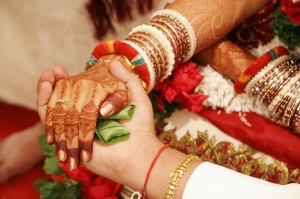In the opinion of the single judge of Delhi High Court, the following questions of law arise for consideration by a division bench of this Court :-
A) Whether a party, which has under a settlement agreement decreed by
a Court undertaken to file a petition under Section 13B(1) or a motion
under Section 13B(2) of the Act, 1955 or both and has also undertaken to
appear before the said Court for obtaining divorce can be held liable for
contempt, if the said party fails to file or appear in the petition or motion or
both to obtain divorce in view of the option to reconsider/renege the
decision of taking divorce by mutual consent under Section 13B(2) of the
Act?
B) Whether by undertaking before a Court to file a second motion under
Section 13B(2) of the Act, 1955 at Section 13B(1) stage or by giving an
undertaking to a Court to that effect in a separate court proceeding, a party
waives its right to rethink/renege under 13B(2) of the Act, 1955? If yes,
whether such right can be waived by a party under Section 13B(2) of the
Act, 1955?
C) Whether any guidelines are required to be followed by the Court
while recording the undertaking/agreement of the parties with respect to a
petition under Section 13B(1) or a motion under Section 13B(2) of the Act,
1955 or both for obtaining divorce?
D) Whether the judgment in Avneesh Sood (supra) and Shikha Bhatia
(supra) are good law in view of the doubts expressed by this Court in paras
19 to 28 and in view of the Division Bench judgment in Dinesh Gulati
CITATION
IN THE HIGH COURT OF DELHI AT NEW DELHI
+ C.M. APPL. 8610/2015 in CONT.CAS(C) 772/2013
RAJAT GUPTA ….. Petitioner
Through Mr. Prashant Mendiratta with
Ms. Poonam Mehndiratta and
Mr. Harshwardhan Pandey,
Advocates
versus
RUPALI GUPTA ….. Respondent
Through Mr. Ankur Mahindro with
Mr. Shresth Choudhary,
Ms. Megha Agarwal, Ms. Devna,
Mr. Adhirath and Mr. Aarzoo Aneja,
Advocates
WITH
+ CONT.CAS(C) 584/2014
KAMAL GODWANI ….. Petitioner
Through Mr. F.K. Jha with Mr. Sarvesh,
Advocates
versus
ANNU BHARTI ….. Respondent
Through Mr. B.K. Srivastava and Mr.Rajeev
Katyain, Advocates.
AND
+ CONT.CAS(C) 483/2016 & C.M. APPLS. 15724/2016, 28622/2016,
42418/2016
W CDR SITANSHU SINHA ….. Petitioner
Through Mr.Ashish Virmani with Ms.Paridhi
Dixit, Advocates.
versus
Cont. Cas.(C) 772/2013 & Ors. Page 2 of 29
PRACHI SINGH @ PRACHI SINHA ….. Respondent
Through Mr.Ajit Kumar with Ms.Nutan
Kumari, Advocates.
AND
+ CONT.CAS(C) 484/2016 & C.M. APPLS. 15728/2016, 42419/2016
WG CDR SITANSHU SINHA ….. Petitioner
Through Mr.Ashish Virmani with Ms.Paridhi
Dixit, Advocates.
versus
PRACHI SINGH @ PRACHI SINHA ….. Respondent
Through Mr.Ajit Kumar with Ms.Nutan
Kumari, Advocates.
AND
+ CONT.CAS(C) 648/2014
- ARUN SHARMA ….. Petitioner
Through Mr.Sunil Mittal, Sr.Advocate with
Ms.Seema Seth and Mr.Dhruv
Grover, Advocates.
versus
POOJA SHARMA ….. Respondent
Through Mr. Prashant Mendiratta with
Ms. Poonam Mehndiratta and
Mr. Harshwardhan Pandey,
Advocates
AND
+ CONT.CAS(C) 1116/2016
AMRITA KAUR SAXENA ….. Petitioner
Through Mr.Amit Grover, Advocate.
Cont. Cas.(C) 772/2013 & Ors. Page 3 of 29
versus
GAURAV SAXENA ….. Respondent
Through Ms.Mrinalini Khatri, Advocate.
AND
+ CONT.CAS(C) 1147/2016
NAVEEN KUMAR JAIN ….. Petitioner
Through Mr.C.Rajaram with Mr.Sashi Panwar
and Mr.T.Kanniappan, Advocates.
versus
INDU JAIN ….. Respondent
Through Mr. Parvinder Chauhan, Advocate
with Mr. Nitin Jain, Advocate.
AND
+ CONT.CAS(C) 1251/2016
VIKAS SHARMA ….. Petitioner
Through Mr.Atul Kharbanda, Advocate.
versus
SHALINI CHHABRA ….. Respondent
Through Mr.Jitendra Kumar Jha with
Mr.Rupam Roy, Advocates.
AND
+ CONT.CAS(C) 484/2014
DEEPAK BATRA ….. Petitioner
Through Mr.Akhilesh Aggarwal, Advocate.
Cont. Cas.(C) 772/2013 & Ors. Page 4 of 29
versus
SWATI BATRA ….. Respondent
Through
% Date of Decision: 09th January, 2017



